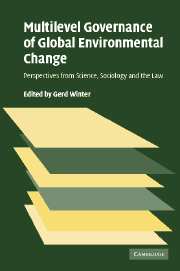 Multilevel Governance of Global Environmental Change
Multilevel Governance of Global Environmental Change Book contents
- Frontmatter
- PREFACE
- Contents
- List of figures
- List of tables
- Notes on contributors
- List of abbreviations
- 1 Introduction
- PART I Earth system analysis
- PART II Society and institutions of global; environmental change
- PART III Self-regulation of industry and the law
- PART IV The potential of the state
- PART V The potential of world regions
- PART VI Formation and implementation of international regimes
- 15 Multilateral environmental agreements and the compliance continuum
- 16 On clustering international environmental agreements
- 17 Institutions, knowledge, and change: findings from the quantitative study of environmental regimes
- PART VII Improving the instruments of global governance
- PART VIII Fundamental concepts of institutionalising common concern
- Index
16 - On clustering international environmental agreements
Published online by Cambridge University Press: 04 May 2010
- Frontmatter
- PREFACE
- Contents
- List of figures
- List of tables
- Notes on contributors
- List of abbreviations
- 1 Introduction
- PART I Earth system analysis
- PART II Society and institutions of global; environmental change
- PART III Self-regulation of industry and the law
- PART IV The potential of the state
- PART V The potential of world regions
- PART VI Formation and implementation of international regimes
- 15 Multilateral environmental agreements and the compliance continuum
- 16 On clustering international environmental agreements
- 17 Institutions, knowledge, and change: findings from the quantitative study of environmental regimes
- PART VII Improving the instruments of global governance
- PART VIII Fundamental concepts of institutionalising common concern
- Index
Summary
Introduction
Even as consensus emerges that creating a World Enviroment Organisation (WEO) is not possible, never mind whether it is desirable, there is widespread consensus that the existing structure of international environmental management needs reform and strengthening. The impetus for this consensus is fourfold:
the creation of the Commission on Sustainable Development (CSD) at the 1992 United Nations Conference on Environment and Development (UNCED) did not result in a strengthening of international environmental regimes;
the World Summit on Sustainable Development (WSSD) to mark the tenth anniversary of UNCED, did nothing to further this debate;
the continuing need to develop international responses to the challenges of sustainable development has resulted in a structure that is increasingly complex and widely viewed as inadequate to the growing needs that are associated with it;
the nexus between international economic and environmental policy has grown increasingly powerful, and threatens to result in a deadlock unless some of the organisational issues are resolved in a satisfactory manner.
This growing consensus that international environmental management needs reform and strengthening found its expression in Decision 21–21 of the Governing Council of the United Nations Environment Programme (UNEP). Yet, while this decision launched a process, there remains a remarkable scarcity of realistic proposals on measures that can be adopted. Based on the documents from the UNEP process, one of the issues that will be important in this debate is that of ‘clustering’, that is grouping a number of international environmental regimes together so as to make them more efficient and effective.
- Type
- Chapter
- Information
- Multilevel Governance of Global Environmental ChangePerspectives from Science, Sociology and the Law, pp. 409 - 429Publisher: Cambridge University PressPrint publication year: 2006
- 1
- Cited by


